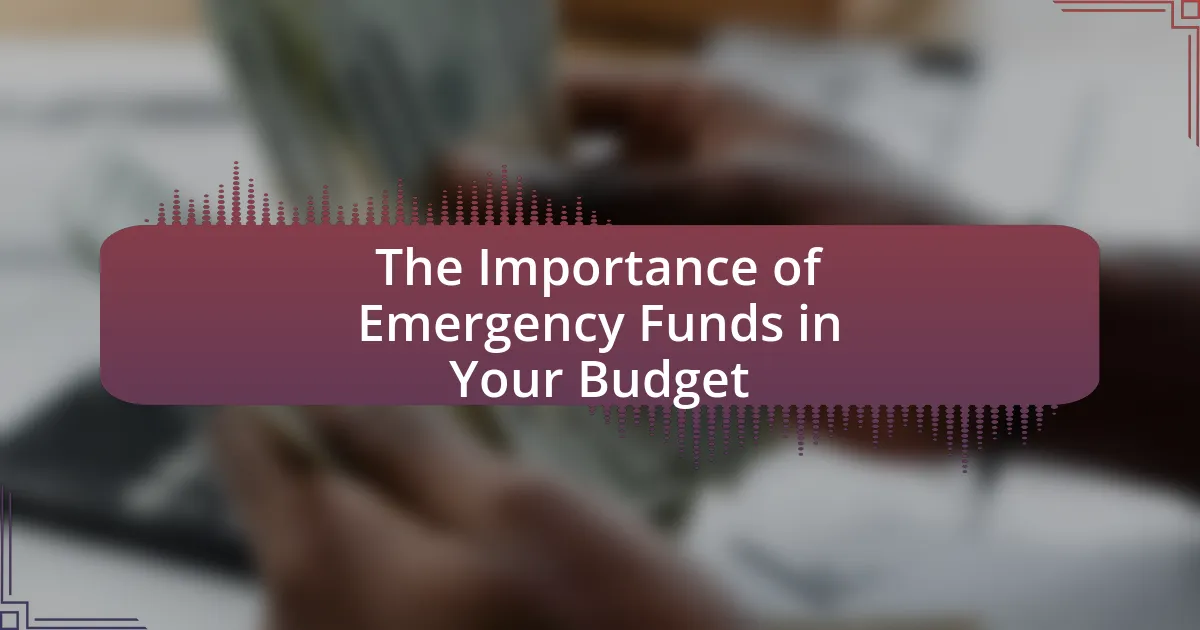The article focuses on effective strategies for adhering to a budget during the holiday season, addressing key challenges such as increased spending pressure, emotional spending, and unexpected expenses. It highlights the significant rise in holiday-related expenditures, with average spending on gifts, food, and decorations impacting financial stability. The article emphasizes the importance of creating a detailed budget, prioritizing expenses, and utilizing budgeting tools to avoid overspending and debt accumulation. Additionally, it discusses the psychological factors influencing holiday spending and offers practical tips for managing finances effectively during this high-spending period.

What are the key challenges of sticking to a budget during the holidays?
The key challenges of sticking to a budget during the holidays include increased spending pressure, emotional spending, and unexpected expenses. Increased spending pressure arises from societal expectations to give gifts and host gatherings, often leading individuals to overspend. Emotional spending occurs as people may feel compelled to buy more to create a festive atmosphere or to compensate for stress, which can derail budget plans. Additionally, unexpected expenses, such as last-minute gifts or travel costs, can disrupt even the most carefully planned budgets. According to a survey by the National Retail Federation, consumers planned to spend an average of $998 on holiday-related expenses in 2021, highlighting the financial strain many face during this season.
How do holiday expenses typically increase during this season?
Holiday expenses typically increase during this season due to heightened consumer spending on gifts, decorations, and festive meals. According to the National Retail Federation, holiday spending in the U.S. reached approximately $886 billion in 2021, reflecting a 14% increase from the previous year. This surge is driven by cultural traditions, promotional sales, and the desire to celebrate, leading to increased financial outlay for households.
What categories of spending should you be aware of?
You should be aware of categories such as gifts, food and beverages, decorations, travel expenses, and entertainment. These categories significantly impact holiday budgets, with gifts often being the largest expense, averaging around $1,000 per household according to the National Retail Federation. Food and beverages can add another substantial amount, with families spending an average of $300 during the holiday season. Decorations and travel can also contribute significantly, with average spending on decorations around $200 and travel costs varying widely based on distance and mode of transport. Lastly, entertainment expenses, including events and outings, can further strain budgets if not monitored.
How can unexpected costs impact your holiday budget?
Unexpected costs can significantly disrupt your holiday budget by causing overspending and financial strain. When unplanned expenses arise, such as emergency repairs or last-minute travel changes, they can lead to reallocating funds from other budgeted categories, resulting in a lack of resources for essential holiday expenses. According to a survey by the American Psychological Association, 61% of Americans report feeling stressed about their financial situation during the holidays, highlighting the impact of unexpected costs on overall financial well-being.
Why is it important to stick to a budget during the holidays?
Sticking to a budget during the holidays is important to prevent overspending and accumulating debt. Research indicates that nearly 30% of consumers exceed their holiday spending limits, leading to financial strain in the following months. By adhering to a budget, individuals can prioritize their expenses, ensuring they allocate funds for essential items while avoiding impulsive purchases. This disciplined approach not only fosters financial stability but also reduces stress associated with holiday spending, allowing for a more enjoyable experience.
What are the long-term benefits of maintaining a holiday budget?
Maintaining a holiday budget offers long-term benefits such as improved financial stability and reduced stress. By adhering to a budget, individuals can avoid accumulating debt during the holiday season, which often leads to financial strain in the following months. Research indicates that consumers who budget effectively are more likely to save money over time, as they develop better spending habits and prioritize essential expenses. Additionally, a study by the National Endowment for Financial Education found that individuals who practice budgeting report higher levels of financial confidence and lower anxiety related to money management. This consistent practice fosters a disciplined approach to finances, ultimately contributing to long-term wealth accumulation and financial security.
How can overspending affect your financial health in the new year?
Overspending can significantly harm your financial health in the new year by leading to increased debt and reduced savings. When individuals exceed their budgets during the holiday season, they often rely on credit cards, which can result in high-interest debt that accumulates over time. According to a 2022 report by the National Retail Federation, 40% of consumers planned to use credit cards for holiday shopping, indicating a reliance on borrowed funds that can strain future finances. This debt can hinder the ability to save for emergencies or retirement, as funds are diverted to pay off accumulated interest and principal. Additionally, overspending can create a cycle of financial stress, making it difficult to adhere to a budget in subsequent months.

What strategies can help you stick to your holiday budget?
To stick to your holiday budget, create a detailed spending plan that outlines all expected expenses, including gifts, decorations, and food. This strategy helps you visualize your financial limits and prioritize essential purchases. Research indicates that individuals who set specific budgets are 30% more likely to adhere to them compared to those who do not. Additionally, using cash instead of credit cards can prevent overspending, as it limits the amount available for discretionary purchases. Studies show that people tend to spend less when using cash, as it creates a tangible sense of expenditure. Lastly, tracking your spending in real-time through budgeting apps can help you stay accountable and adjust your spending habits as needed.
How can creating a detailed holiday budget aid in financial planning?
Creating a detailed holiday budget aids in financial planning by providing a clear framework for managing expenses and preventing overspending. This structured approach allows individuals to allocate specific amounts for gifts, travel, and entertainment, ensuring that all holiday-related costs are accounted for. Research indicates that consumers who budget are 50% more likely to stick to their financial goals, as they can track their spending against their planned budget, making adjustments as necessary. By establishing a detailed budget, individuals can maintain control over their finances during the holiday season, reducing stress and promoting better financial health.
What elements should be included in your holiday budget?
A holiday budget should include essential elements such as travel expenses, accommodation costs, food and beverage spending, gifts, entertainment, and miscellaneous expenses. Travel expenses encompass transportation costs like flights or gas, while accommodation costs cover hotel or rental fees. Food and beverage spending includes meals at restaurants and groceries for home-cooked meals. Gifts refer to the budget allocated for presents for family and friends. Entertainment encompasses activities such as events, outings, or holiday attractions. Miscellaneous expenses can include decorations, holiday cards, and any unexpected costs. Including these elements ensures a comprehensive approach to managing holiday finances effectively.
How can you prioritize your spending to stay within budget?
To prioritize your spending and stay within budget, create a detailed budget plan that categorizes your expenses into needs, wants, and savings. This approach allows you to allocate funds effectively, ensuring essential expenses are covered first while limiting discretionary spending. Research indicates that individuals who categorize their expenses are 30% more likely to adhere to their budgets, as it provides clarity on where money is going and helps identify areas for potential cuts. By regularly reviewing and adjusting your budget based on actual spending, you can maintain control over your finances during the holiday season.
What role does planning play in sticking to your budget?
Planning is essential for sticking to your budget as it establishes a clear framework for financial decisions. By outlining specific spending limits and prioritizing expenses, individuals can avoid impulsive purchases that lead to budget overruns. Research indicates that people who create detailed budgets are 50% more likely to adhere to their financial goals compared to those who do not plan. This structured approach allows for better tracking of expenses and adjustments as needed, ultimately fostering financial discipline during high-spending periods like the holidays.
How can setting spending limits for gifts and activities help?
Setting spending limits for gifts and activities helps individuals manage their finances effectively during the holiday season. By establishing a clear budget, people can prioritize their spending, ensuring they do not exceed their financial means. This practice reduces the likelihood of accumulating debt, as it encourages mindful purchasing and prevents impulse buys. Research indicates that consumers who set specific spending limits are more likely to stick to their budgets, leading to a more financially stable holiday experience.
What tools or apps can assist in tracking your holiday expenses?
Tools and apps that assist in tracking holiday expenses include Mint, YNAB (You Need A Budget), and PocketGuard. Mint allows users to categorize expenses and set budgets, providing a comprehensive overview of spending habits. YNAB focuses on proactive budgeting, helping users allocate funds for specific expenses, which is particularly useful during the holiday season. PocketGuard simplifies expense tracking by showing how much disposable income is available after accounting for bills, goals, and necessities. These tools are widely recognized for their effectiveness in managing finances, with Mint having over 20 million users and YNAB reporting that users save an average of $600 in their first two months.

How can you avoid common pitfalls that lead to overspending?
To avoid common pitfalls that lead to overspending, create a detailed budget and stick to it. Establishing a budget helps individuals allocate specific amounts for different categories, such as gifts, food, and entertainment, which can prevent impulsive purchases. Research indicates that consumers who plan their spending are 30% less likely to exceed their budget compared to those who do not. Additionally, tracking expenses in real-time can provide immediate feedback, allowing for adjustments before overspending occurs.
What psychological factors contribute to holiday overspending?
Psychological factors contributing to holiday overspending include social pressure, emotional spending, and the desire for instant gratification. Social pressure arises from societal expectations to give gifts and participate in celebrations, leading individuals to spend beyond their means to fit in. Emotional spending occurs when people use shopping as a coping mechanism for stress or loneliness during the holiday season, often resulting in impulsive purchases. The desire for instant gratification drives consumers to prioritize immediate pleasure over long-term financial health, leading to excessive spending on gifts and experiences. Research indicates that these psychological influences can significantly impact financial decision-making, with studies showing that emotional states can alter spending behavior, making individuals more likely to overspend during emotionally charged periods like the holidays.
How can peer pressure influence your spending habits?
Peer pressure can significantly influence spending habits by creating a desire to conform to the financial behaviors of friends or social groups. Individuals may feel compelled to spend more on gifts, experiences, or luxury items to fit in or gain approval, especially during the holiday season when social gatherings and gift exchanges are prevalent. Research indicates that social influences can lead to increased spending; for example, a study published in the Journal of Consumer Research found that individuals are more likely to make impulsive purchases when they are in the presence of peers who are also spending freely. This tendency can result in budget overruns and financial strain, particularly during holidays when expectations for gift-giving and social activities are heightened.
What strategies can help you resist impulse purchases?
To resist impulse purchases, implement strategies such as creating a detailed shopping list and setting a strict budget before shopping. Research indicates that consumers who plan their purchases are less likely to make unplanned buys, as a study by the Journal of Consumer Research found that pre-commitment to a budget reduces the likelihood of impulse spending. Additionally, delaying purchases by 24 hours can help individuals evaluate their needs versus wants, further decreasing the chances of impulsive buying.
How can you make the most of sales and discounts without overspending?
To make the most of sales and discounts without overspending, create a budget and prioritize your purchases before shopping. This approach ensures that you only buy items you need or genuinely want, preventing impulse buys that can lead to overspending. Research shows that consumers who set a budget are 30% more likely to stick to their spending limits during sales events. Additionally, using tools like price comparison apps can help verify that the sale price is genuinely lower than the regular price, further ensuring that you are making informed purchasing decisions.
What are the best practices for shopping during holiday sales?
The best practices for shopping during holiday sales include creating a budget, making a shopping list, and comparing prices. Establishing a budget helps consumers limit their spending and avoid impulse purchases, which is crucial during the holiday season when sales can be enticing. A shopping list ensures that buyers focus on necessary items, reducing the likelihood of overspending on non-essential products. Additionally, comparing prices across different retailers can lead to better deals, as studies show that consumers can save an average of 20% by shopping around. These practices collectively help maintain financial discipline while taking advantage of holiday sales.
How can you differentiate between a good deal and unnecessary spending?
To differentiate between a good deal and unnecessary spending, evaluate the value and necessity of the purchase against your budget and financial goals. A good deal typically offers significant savings on items you need or have planned to buy, while unnecessary spending involves impulsive purchases that do not align with your budget or priorities. For instance, a study by the National Retail Federation found that 61% of consumers reported overspending during the holidays due to unplanned purchases, highlighting the importance of sticking to a budget to avoid unnecessary expenses.
What are some practical tips for sticking to your budget during the holidays?
To stick to your budget during the holidays, create a detailed spending plan that outlines all anticipated expenses, including gifts, decorations, and food. This approach helps you allocate funds effectively and avoid overspending. Research shows that individuals who set a budget are 50% more likely to stay within their financial limits during the holiday season. Additionally, using cash instead of credit cards can prevent impulse purchases, as physical cash limits your spending to what you have on hand. Tracking your expenses in real-time through budgeting apps can also enhance awareness and accountability, further supporting adherence to your budget.
How can meal planning and potlucks save money during holiday gatherings?
Meal planning and potlucks can save money during holiday gatherings by reducing food waste and sharing costs among participants. Meal planning allows hosts to create a shopping list based on specific recipes, ensuring that only necessary ingredients are purchased, which minimizes excess spending. Potlucks further enhance savings by distributing the cost of food preparation across multiple guests, allowing each person to contribute a dish rather than one individual bearing the entire expense. According to a study by the American Farm Bureau Federation, hosting a potluck can reduce the average cost of a holiday meal by up to 50%, as guests bring diverse dishes that collectively create a festive spread without a significant financial burden on any single person.
What are some creative gift ideas that are budget-friendly?
Creative gift ideas that are budget-friendly include handmade items, personalized photo albums, and experience gifts such as cooking classes or local tours. Handmade items, like knitted scarves or homemade candles, often cost less than store-bought alternatives and add a personal touch. Personalized photo albums can be created using online services that offer affordable printing options, allowing for a unique gift that captures memories. Experience gifts, which focus on activities rather than physical items, can often be found at lower prices and provide lasting memories, making them a thoughtful and economical choice.





